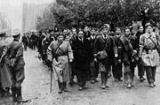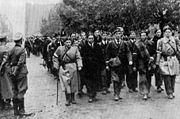
The capitulation of Warsaw after the Warsaw Uprising
Encyclopedia
The Warsaw Uprising
of 1944 was ended through a capitulation
agreement which guaranteed not only the rights of the insurgents
to be treated as Prisoners of War but also was designed to guarantee the fair treatment of the civilians living in Warsaw
. This agreement, between General Tadeusz Bór-Komorowski
and General Erich von dem Bach
, which had taken a long period of on and off negotiations to achieve.
signed the capitulation of the remaining Polish forces (Warszawski Korpus Armii Krajowej or Home Army Warsaw Corps) in the German headquarters in the presence of general von dem Bach. According to the capitulation treaty, the Home Army soldiers were to be treated in accordance with the Geneva Convention and the civilian population was to be treated humanely.
The next day the Germans began to disarm the Home Army soldiers. Most of them were later sent to POW camps in various parts of Germany
. At the same time the civilian population (approximately 700,000) was resettled to concentration camps west of Warsaw. Many soldiers, fearing German atrocities in captivity, chose to blend into the civilian population, escape Warsaw among them and continue the fight later.
 There are several factors responsible for the failure, although there is no consensus about all of them nor their relative importance.
There are several factors responsible for the failure, although there is no consensus about all of them nor their relative importance.
One of the main reasons for the failure of the uprising was the lack of expected support from the Soviet Red Army
. Soviet assistance to the Home Army on the eastern territories was limited to small collaboration on a tactical level at best, with common incidents of shooting or imprisoning of Home Army soldiers after the area was seized by Soviets. During the Warsaw Uprising the Red Army stood on the other bank of the Vistula River and only elements from the Polish 1 Armia Wojska Polskiego attempted to make a crossing and received artillery support. The Soviet High Command did not allow pilots from the RAF
and the Polish Air-forces to use Soviet landing strips. After the initial radio and leaflet propaganda campaign, the Moscow
-backed Wanda radio station
remained silent until the very end of fighting. It has been argued that the Soviets deliberately allowed the Germans to defeat the Home Army in order to eliminate a force in Poland which would oppose the communist puppet government the Soviets planned to install in Poland. This is consistent with later Soviet treatment of many Home Army soldiers, who were usually imprisoned, tortured and executed.
The decision to begin the Uprising can be viewed more as a political one (a demonstration to show the Soviets and the Western Allies that the Polish government-in-exile had control over the country) than a military one (since the military situation was worsening, as German troops in Warsaw were being strengthened and reinforced). The decision to start the Uprising was rushed several times: first on 20 July, when plans for Operation Tempest were changed to include Warsaw (after the series of reports on aggressive actions by Soviets toward Home Army units in the eastern territories), then on 31 July when exaggerated reports of approaching Russian forces convinced some decision makers that if they did not start the Uprising soon it would be too late to aid the Russians and 'make a stand'. Due to this rushed change of plans, personnel and ammunition available at the time of "W-hour" in Warsaw were not optimal.
, British
or Soviet
forces. This would have a big effect on their later lives.
Warsaw Uprising
The Warsaw Uprising was a major World War II operation by the Polish resistance Home Army , to liberate Warsaw from Nazi Germany. The rebellion was timed to coincide with the Soviet Union's Red Army approaching the eastern suburbs of the city and the retreat of German forces...
of 1944 was ended through a capitulation
Capitulation (treaty)
A capitulation , or ahidnâme, is a treaty or unilateral contract by which a sovereign state relinquishes jurisdiction within its borders over the subjects of a foreign state...
agreement which guaranteed not only the rights of the insurgents
Insurgency
An insurgency is an armed rebellion against a constituted authority when those taking part in the rebellion are not recognized as belligerents...
to be treated as Prisoners of War but also was designed to guarantee the fair treatment of the civilians living in Warsaw
Warsaw
Warsaw is the capital and largest city of Poland. It is located on the Vistula River, roughly from the Baltic Sea and from the Carpathian Mountains. Its population in 2010 was estimated at 1,716,855 residents with a greater metropolitan area of 2,631,902 residents, making Warsaw the 10th most...
. This agreement, between General Tadeusz Bór-Komorowski
Tadeusz Bór-Komorowski
General Count Tadeusz Komorowski , better known by the name Bór-Komorowski was a Polish military leader....
and General Erich von dem Bach
Erich von dem Bach
Erich Julius Eberhard von Zelewski or Erich von dem Bach-Zelewski , was a Nazi official and a member of the SS, in which he reached the rank of SS-Obergruppenführer .- Slavic origin :...
, which had taken a long period of on and off negotiations to achieve.
Signing of the Capitulation Treaty
On October 3 General Tadeusz Bór-KomorowskiTadeusz Bór-Komorowski
General Count Tadeusz Komorowski , better known by the name Bór-Komorowski was a Polish military leader....
signed the capitulation of the remaining Polish forces (Warszawski Korpus Armii Krajowej or Home Army Warsaw Corps) in the German headquarters in the presence of general von dem Bach. According to the capitulation treaty, the Home Army soldiers were to be treated in accordance with the Geneva Convention and the civilian population was to be treated humanely.
The next day the Germans began to disarm the Home Army soldiers. Most of them were later sent to POW camps in various parts of Germany
Germany
Germany , officially the Federal Republic of Germany , is a federal parliamentary republic in Europe. The country consists of 16 states while the capital and largest city is Berlin. Germany covers an area of 357,021 km2 and has a largely temperate seasonal climate...
. At the same time the civilian population (approximately 700,000) was resettled to concentration camps west of Warsaw. Many soldiers, fearing German atrocities in captivity, chose to blend into the civilian population, escape Warsaw among them and continue the fight later.
Reasons for Failure

One of the main reasons for the failure of the uprising was the lack of expected support from the Soviet Red Army
Red Army
The Workers' and Peasants' Red Army started out as the Soviet Union's revolutionary communist combat groups during the Russian Civil War of 1918-1922. It grew into the national army of the Soviet Union. By the 1930s the Red Army was among the largest armies in history.The "Red Army" name refers to...
. Soviet assistance to the Home Army on the eastern territories was limited to small collaboration on a tactical level at best, with common incidents of shooting or imprisoning of Home Army soldiers after the area was seized by Soviets. During the Warsaw Uprising the Red Army stood on the other bank of the Vistula River and only elements from the Polish 1 Armia Wojska Polskiego attempted to make a crossing and received artillery support. The Soviet High Command did not allow pilots from the RAF
Royal Air Force
The Royal Air Force is the aerial warfare service branch of the British Armed Forces. Formed on 1 April 1918, it is the oldest independent air force in the world...
and the Polish Air-forces to use Soviet landing strips. After the initial radio and leaflet propaganda campaign, the Moscow
Moscow
Moscow is the capital, the most populous city, and the most populous federal subject of Russia. The city is a major political, economic, cultural, scientific, religious, financial, educational, and transportation centre of Russia and the continent...
-backed Wanda radio station
Wanda Radio Station
Wanda Radio Station was a Soviet Polish language propaganda broadcast station during the World War II.Created in 1944, the Wanda Radio Station was attached to the Red Army units fighting on the Eastern Front...
remained silent until the very end of fighting. It has been argued that the Soviets deliberately allowed the Germans to defeat the Home Army in order to eliminate a force in Poland which would oppose the communist puppet government the Soviets planned to install in Poland. This is consistent with later Soviet treatment of many Home Army soldiers, who were usually imprisoned, tortured and executed.
-
- See Operation TempestOperation TempestOperation Tempest was a series of uprisings conducted during World War II by the Polish Home Army , the dominant force in the Polish resistance....
for aftermath of other actions of that operation
- See Operation Tempest
The decision to begin the Uprising can be viewed more as a political one (a demonstration to show the Soviets and the Western Allies that the Polish government-in-exile had control over the country) than a military one (since the military situation was worsening, as German troops in Warsaw were being strengthened and reinforced). The decision to start the Uprising was rushed several times: first on 20 July, when plans for Operation Tempest were changed to include Warsaw (after the series of reports on aggressive actions by Soviets toward Home Army units in the eastern territories), then on 31 July when exaggerated reports of approaching Russian forces convinced some decision makers that if they did not start the Uprising soon it would be too late to aid the Russians and 'make a stand'. Due to this rushed change of plans, personnel and ammunition available at the time of "W-hour" in Warsaw were not optimal.
Destiny of the Warsaw civilians
Most civilians were not killed and many were released into the country west of Warsaw, but some were sent to concentration camps or subjected to slave labour.Destiny of the Fighters
Most fighters were sent to POW camps in various parts of Germany. Depending on where they were sent, they were later liberated by U.S.United States
The United States of America is a federal constitutional republic comprising fifty states and a federal district...
, British
United Kingdom
The United Kingdom of Great Britain and Northern IrelandIn the United Kingdom and Dependencies, other languages have been officially recognised as legitimate autochthonous languages under the European Charter for Regional or Minority Languages...
or Soviet
Soviet Union
The Soviet Union , officially the Union of Soviet Socialist Republics , was a constitutionally socialist state that existed in Eurasia between 1922 and 1991....
forces. This would have a big effect on their later lives.

